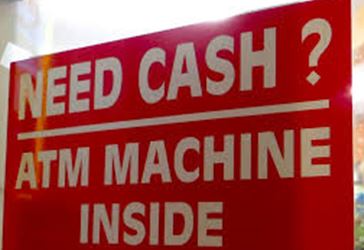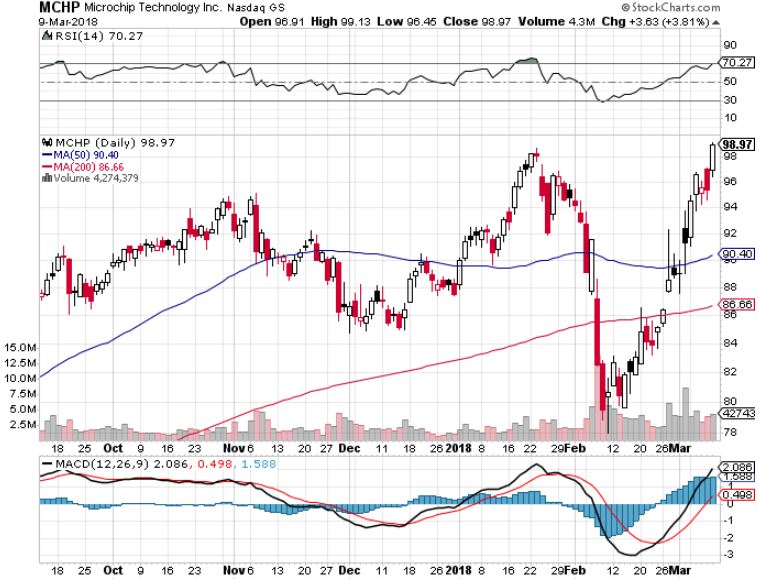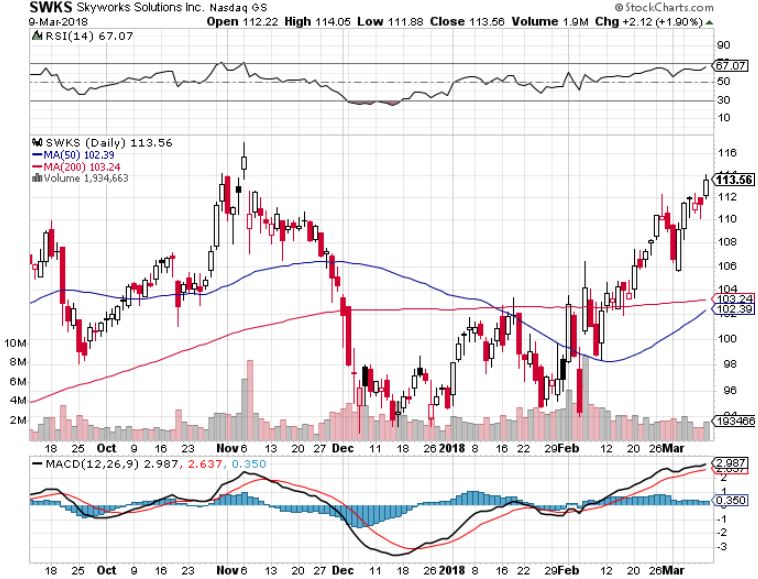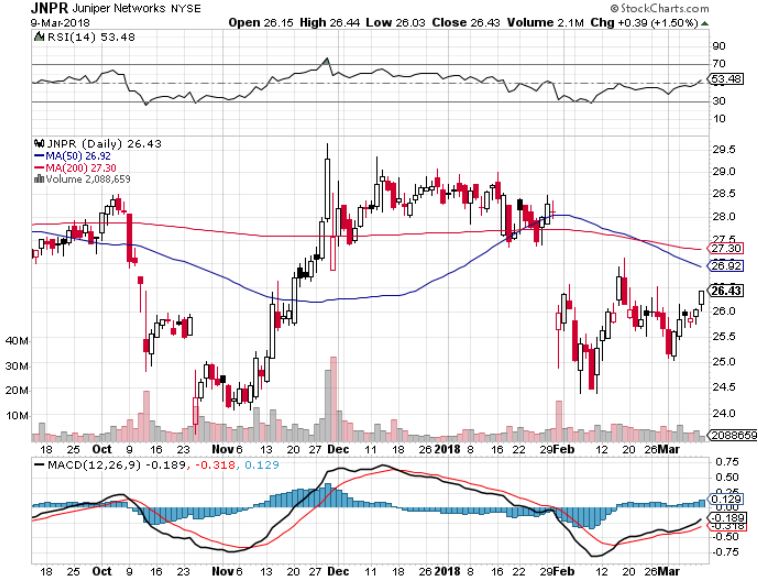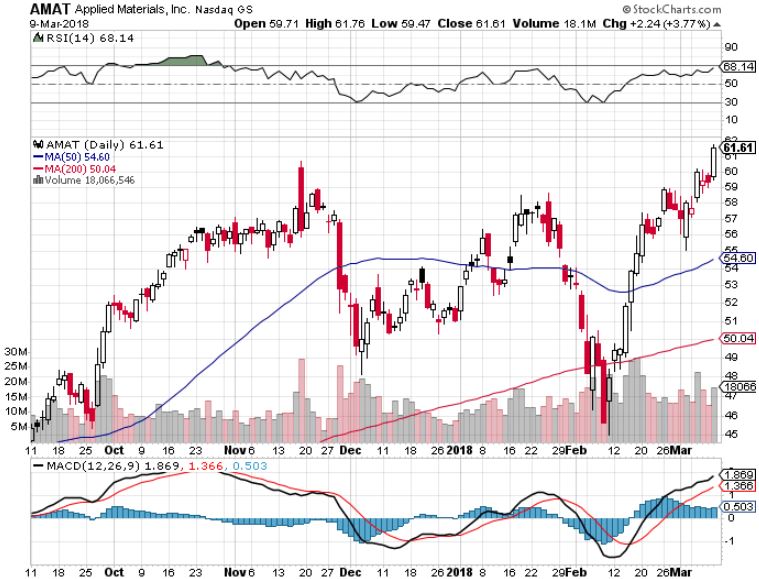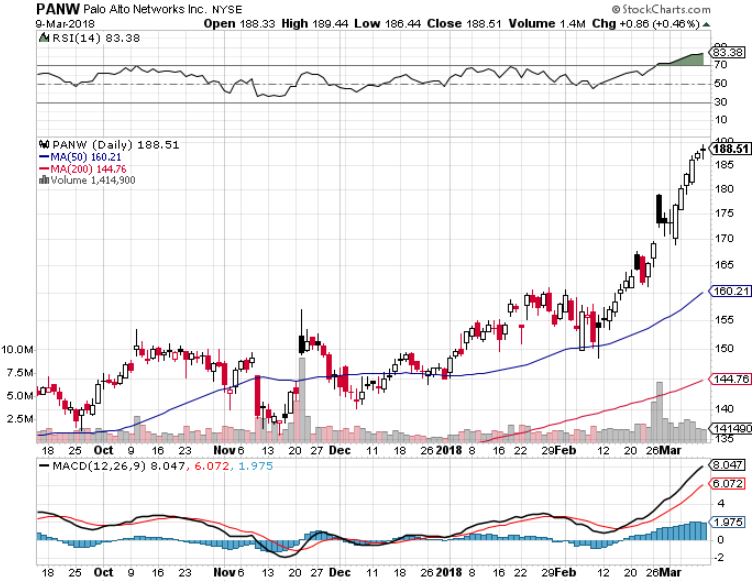Mad Hedge Technology Alerts!
Mad Hedge Technology Letter
March 12, 2018
Fiat Lux
Featured Trade:
(WHERE ALL THAT TAX CUT MONEY WENT)
(CISCO), (MSCC), (MCHP), (SWKS), (JNPR), (AMAT), (PANW), (UBER), (AMZN)
I bet you are wondering where all that money from the tax cuts is going.
Believe it or not, the number one destination of this new windfall is technology companies, not just the stocks, but entire companies.
In fact, the takeover boom in Silicon Valley has already started, and it is rapidly accelerating.
The only logical conclusion in 2018 is that tech firms are about to get a lot more expensive. I'll explain exactly why.
The corporate cash glut is pushing up prices for unrealized M&A activity in 2018. U.S. firms accumulated an overseas treasure trove of around $2.6 trillion and the capital is spilling back into the States with a herd type mentality.
I have chewed the fat with many CEO's about their cash pile road map. All mirrored each other to a T - strategic acquisition and share buy backs, period. The acquisition effect will be felt through all channels of the tech arterial system in 2018.
As the global race to acquire the best next generation technology heats up, domestic mergers could pierce the 400-deal threshold after a lukewarm 2017.
Apple alone boomeranged back over $250 billion with hopes of selective mergers and share buy backs. Cisco (CSCO), Microsoft (MSFT), and Google (GOOGL) were also in the running for most cash repatriated.
The tech behemoths are eager to make transformative injections into security, big data, semiconductor chips, and SaaS (service as a software) among others.
Hint: you want to own stocks in all of these areas.
U-turns from legacy technology firms hawking desktop computers and HDD's (Hard Disk Drive) suddenly realize they are behind the eight ball.
M&A activity will naturally tilt towards firms dabbling in earlier-stage software and 5G supported technology. This flourishing trend will reshape autonomous vehicles and IoT (Internet of Things) products.
The dilemma in waiting to splash on a potential new expansion initiative is that the premium grows with the passage of time. Time is money.
Unleashing the M&A beast comes amid a seismic shift of rapid consolidation in the semiconductor sector. Cut costs to compete now or get crushed under the weight of other rivals that do. Ruthless rules of the game cause ruthless executive decisions.
The best way to cut costs is with immense scale to offer nice shortcuts in the cost structure. Buying another company and using each other's dynamism to find a cheaper way to operate is what Microchip Technology (MCHP) culling of Microsemi Corporation (MSCC) in a deal worth $10bn was about.
Microsemi, based in Aliso Viejo, California, focuses on manufacturing chips for aerospace, military, and communications equipment.
Microchip's focal point is industrial, automobile and IoT products.
Included in the party bag is a built-in $1.8 billion annual revenue stream and over $300 million of dynamic synergies set to take effect within three years. The bonus from this package is the ability to cross- sell chips into unique end markets opposed to selling from scratch.
Each business hyper-targets different segments of the chip industry and are highly complementary.
Benefits of a relatively robust credit market create an environment ripe for mergers. Some 57% of tech management questioned intend to go on the prowl for marquee pieces to add to their arsenal.
No need to mince words here, 2018 is overwhelmingly a sellers' market. Nimble buyers should prepare for price wars as the new normal.
Not only are the plain vanilla big cap tech firms dicing up ways to enter new markets, alternative funds are looking to splash the cash too.
Sovereign wealth funds and private equity firms are ambitiously circling around like vultures above waiting for the prey to show itself.
Private equity firms dove head first into the M&A circus already tripling output for tech firms.
Highlighting the synchronized show of force is no other than Travis Kalanick, the infamous founder of Uber. He christened his own venture capital fund that hopes to invest in e-commerce, real estate and companies located in China and India.
The new fund is called 10100 and is backed by his own money. All this is possible because of Masayoshi Son's, CEO of Softbank, investment in Uber, which netted Kalanick a cool $1.4 billion representing Kalanick's 30% stake in Uber.
It is undeniable that valuations are exorbitant, but all data and chip related companies are selling for huge premiums. The premium will only increase as the applications of 5G, A.I., autonomous cars start to pervade deeper into the mainstream economy.
Adding fuel to the fire is the corporate tax cut. The lower tax rate will rotate more cash into M&A instead of Washington's tax coffers enhancing the ability for companies to stump up for a higher bill. Sellers know firms are bloated with cash and position themselves accordingly.
Highlighting the challenges buyers face in a sellers' market is Microsemi Corp. (MSCC) purchase of PMC-Sierra Inc. Even though PMC-Sierra had been looking to get in bed with Skyworks Solutions Inc. (SWKS) just before the MSCH merger, PMC-Sierra reneged on the acquisition after (SWKS) refused to bump up its original offer.
(SWKS) manufactures radio frequency semiconductors facilitating communication between smartphones, tablets and wireless networks found in iPhones and iPads.
(SWKS) is a prime takeover target for Apple. (SWKS) estimates to have the highest EPS growth over the next 3-5 years for companies not already participating in M&A. Apple (AAPL) could briskly mold this piece into its supply chain. Directly manufacturing chips would be a huge boon for Apple in a chip market in short supply.
In 2013, Japan's Tokyo Electron and Applied Materials (AMAT) angled to become one company called Eteris. This maneuver would have created the world's largest supplier of semiconductor processing equipment.
After two years of regulatory review, the merger was in violation of anti-trust concerns according to the United States. (AMAT), headquartered in Santa Clara, California, is a premium target as equipment is critical to manufacturing semiconductor chips. (AMAT) compete directly with Lam Research (LRCX) who is an absolute gem of a company.
Juniper Networks (JNPR) sells the third most routers and switches used by ISP's (Internet Service Providers). They are also number two in core routers with a 25% market share. Additionally, (JNPR) has a 24.8% market share of the firewall market.
In 2014, Palo Alto Networks (PANW), another takeover target focusing on cybersecurity, paid a $175 million settlement fee for allegedly infringing (JNPR)'s application firewall patents.
In data center security applications, (JNPR) routinely plays second fiddle to Cisco Systems (CSCO). Cisco, the best of breed in this space would benefit by snapping up (JNPR) and integrating their expertise into an expanding network.
Unsurprisingly, health care is the other sector experiencing a tidal wave of M&A and it's not shocking that health care firms accumulated cash hoards abroad too. The dots are all starting to connect.
Firms want to partner with innovative companies. Companies hope to focus on customer demands and build a great user experience that will lead the economy. Health care costs are outrageous in America and Jeff Bezos could flip this industry on its head.
Amazon (AMZN) pursuing lower health costs ultimately will bind these two industries together at the hip and is net positive for the American consumer.
Ride sharing company Uber embarked on a new digital application called Uber Health that book patients who are medically unfit for regular Uber and shuttle them around to hospital facilities.
Health care providers can hail a ride for sick people immediately and are able to make an appointment 30-days in advance. It is a little difficult to move around in a wheel chair, and tech solves problems that stir up zero appetite for most business ventures. Apple is another large cap tech titan keeping close tabs on the health care space.
It's a two-way street with health care companies looking to snap up exceptional tech and vice-versa.
It's practically a game of musical chairs.
Ultimately, Tech M&A is the catch of the day and boosting earnings requires game changing technology. Investors will be kicking themselves for waiting too long, buy now while you can.
Yes, It's All Going Into Tech Stocks
Mad Hedge Technology Letter
March 9, 2018
Fiat Lux
Featured Trade:
(WHY CHINA IS DRIVING UP THE VALUE OF YOUR TECH STOCKS)
(QCOM), (AVGO), (AMD), (MSFT), (GOOGL), (AAPL), (INTC), (LSCC)


